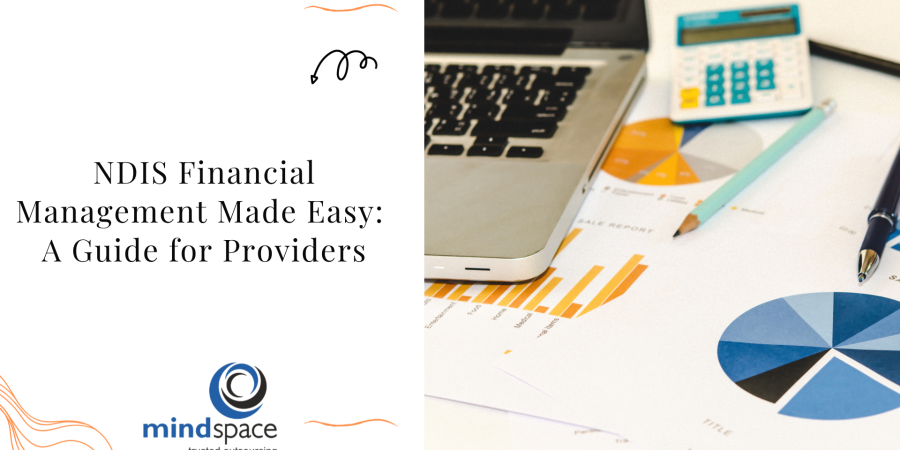NDIS Financial Management Made Easy: A Guide for Providers
As the National Disability Insurance Scheme (NDIS) continues to grow across Australia, so does the need for providers to implement reliable and compliant financial management systems. Whether you’re new to the NDIS or an experienced provider, handling the NDIS financial requirements can be challenging—especially when juggling participant care, staffing, and business operations.
This comprehensive guide simplifies NDIS financial management, helping service providers stay compliant, streamline operations, and focus on delivering exceptional care.
What is NDIS Financial Management?
NDIS financial management refers to the systems and processes used by providers to handle finances under the scheme. This includes:
-
Invoicing and submitting claims via the NDIS portal
-
Managing participant budgets and service agreements
-
Processing payroll and contractor payments
-
Maintaining accurate bookkeeping and compliance reports
-
Preparing for audits and financial planning
These tasks can be done in-house or outsourced to NDIS accounting experts who understand the scheme’s unique financial and regulatory environment.
Why Financial Management Matters for NDIS Providers
Effective financial management is crucial to maintaining stability and meeting compliance standards. Here’s why it matters:
✅ Cash Flow Stability
Timely invoicing and efficient claim submissions ensure smooth day-to-day operations and prevent cash shortages.
✅ Regulatory Compliance
Providers must keep clear financial records, comply with ATO regulations, and prepare for NDIS audits under the NDIS Quality and Safeguards Commission.
✅ Growth and Sustainability
Tracking costs, income, and profit margins enables strategic planning and service expansion.
Failure to manage finances properly can lead to delayed payments, compliance breaches, or even suspension from the NDIS provider register.
Common NDIS Financial Management Challenges
NDIS providers face financial challenges not seen in other industries, including:
-
Complex claim procedures: Correct line items, codes, and documentation are required to avoid delays or rejections.
-
Participant budget management: Helping participants use their funds wisely without exceeding allocations.
-
Regulatory oversight: Ongoing compliance with ATO, NDIS Practice Standards, and audit readiness.
-
Time constraints: Many small providers lack dedicated finance teams, making it difficult to juggle admin and client support.
6 Building Blocks for Effective NDIS Financial Management
1. Use the Right NDIS Accounting Software
Implement accounting tools that are:
-
Cloud-based for easy remote access
-
Able to track income by participant and service type
-
Integrated with payroll and rostering systems
-
Compatible with automatic invoicing and NDIS claim submissions
Popular choices include Xero, QuickBooks, MYOB, or NDIS-specific platforms like CareMaster, Brevity, and Lumary.
2. Understand the NDIS Price Guide
NDIS services have capped rates. Providers should:
-
Regularly review the NDIS Pricing Arrangements and Price Limits
-
Align invoices with approved line items and pricing caps
-
Understand GST exemptions for eligible services
This ensures compliance and prevents undercharging or overcharging, which can affect both your reputation and profitability.
3. Maintain Timely Bookkeeping
Weekly or daily bookkeeping helps you:
-
Track incoming payments from NDIS claims
-
Record all operational expenses—wages, rent, utilities, etc.
-
Reconcile bank accounts and manage cash flow
-
Stay ready for tax filing and audits
Accurate records are the foundation of financial reporting, ATO compliance, and business health.
4. Budget and Forecast Regularly
Use budgeting tools to map out:
-
Estimated participant income
-
Payroll and contractor expenses
-
Overheads and operational costs
Forecasting helps you identify funding gaps, allocate resources efficiently, and make data-driven decisions.
5. Streamline Payroll and Superannuation
Stay compliant with Fair Work and ATO requirements by:
-
Managing wages, entitlements, and award conditions
-
Automating superannuation contributions and tax reporting
-
Tracking leave, overtime, and contractor payments
Utilizing tools like Deputy, KeyPay, or Employment Hero can enhance efficiency and mitigate compliance risks.
6. Be Audit-Ready
NDIS audits are mandatory for providers delivering certain supports. Ensure:
-
All invoices, receipts, and service agreements are well-organized
-
Participant funding and service data are securely stored
-
Financial records can support all reported figures
-
Reports clearly reflect income, expenses, and provider obligations
Audit readiness reflects professionalism and builds trust with both participants and regulators.
Should You Outsource NDIS Financial Management?
Outsourcing your financial management to NDIS accounting specialists can save time and reduce risk. Key benefits include:
-
Access to NDIS-experienced accountants
-
Reduced risk of claim rejections or audit penalties
-
Time saved on admin so you can focus on participant care
-
Scalable support as your business grows
Services may include bookkeeping, payroll, BAS/IAS preparation, and virtual CFO support.
Choosing the Right NDIS Financial Partner
When selecting an NDIS accounting firm, look for:
-
Proven experience with NDIS providers
-
Familiarity with NDIS software and claim processes
-
Transparent pricing and service flexibility
-
Strong compliance history with NDIS, ATO, and audit standards
-
Proactive communication and detailed financial reporting
A great partner won’t just manage your accounts—they’ll help you grow with confidence.
Final Thoughts: Financial Clarity Enables Better Support
In the disability support sector, financial management isn’t just a back-office function—it’s a pillar of operational excellence. With rising demand for services and increasing regulatory oversight, NDIS providers must adopt structured, scalable, and compliant financial systems.
Whether you’re running a solo allied health practice or managing a large support organization, embracing smart financial practices and expert support allows you to:
✅ Expand your services
✅ Support more participants
✅ Stay audit-ready and compliant
✅ Grow sustainably
Ready to Simplify Your NDIS Financial Management?
If you’re looking for a reliable NDIS accounting partner, get in touch with a team that understands your business, your obligations, and your goals. With the right tools and guidance, NDIS financial management doesn’t have to be overwhelming—it can be your greatest strength.


